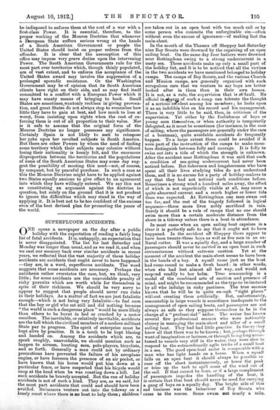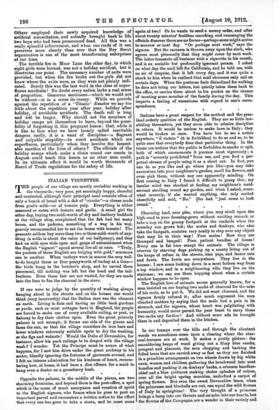SUPERFLUOUS ACCIDENTS.
ONE opens a newspaper on the day after a public holiday with the expectation of reading a fairly long list of fatal accidents. It is, unhappily, an expectation that is never disappointed. The list for last Saturday and Monday was longer than usual, and as we read it, and when we cast our memory back over similar accidents in recent years, we reflected that the vast majority of these holiday accidents are accidents that ought never to have happened —they are, in a word, superfluous accidents. The word suggests that some accidents are necessary. Perhaps the antithesis rather overstates the case, but, we think, very little ; for some accidents are the unavoidable penalty of risky pursuits which are worth while for themselves in spite of their riskiness. We should be very sorry to appear to suggest that people should. never run risks in their holidays. As a matter of fact we are just fatalistic enough—which is not being very fatalistic—to feel sure that the boy or girl who sat still and did nothing because " the world is such a dangerous place " would be more likely than others to be burnt in bed or crushed by a motor omnibus. The inevitable, or relatively inevitable, accidents are the toll which the civilized members of a modern militant State pay to progress. The spirit of enterprise must be kept alive by practice. It is a torch to be kept blazing and handed on. Among the accidents which are, to speak roughly, unavoidable, we should mention such as happen to airmen, hunting men, polo-players, bicyclists, and so forth. Generally a man could not by ordinary precautions have prevented the failure of his aeroplane engine, or have foreseen the presence of an air pocket, or have known that his horse would put him down at a particular fence, or have suspected that his bicycle would snap at the head when he was coasting down a hill. Let such accidents be bravely accepted. But the run of holiday accidents is not of such a kind. They are, as we said, for the most part accidents that could and should have been avoided. Swimmers venture out into the tideway on a lonely coast where there is no boat to help them; children are taken out in an open boat with too much sail or by some person who commits the unforgivable sin—often without even the excuse of ignorance—of making fast the main-sheet.
In the mouth of the Thames off Sheppey last Saturday nine Boy Scouts were drowned by the capsizing of an open sailing boat. On the same day four bathers were drowned near Rottingdean owing to a strong undercurrent in a nasty sea. These accidents make up only a small part of the holiday list, and it is to be noticed that all the victims in the two accidents we have mentioned belonged to holiday camps. The camps of Boy Scouts, and the various Church and Mission camps, are generally organized with such scrupulous care that we venture to say boys are better looked after in them than in their own homes. It is not, as a rule, the sal ervision that is at-latilt. No official inkarggof such a camp can tolerate the thought of a serious aJident among his members ; he looks upon it as an indelible blot on his record and his management. There is very little to be said, then, in criticism of the supervision. Yet either by the foolishness of boys or young men themselves, or when authority is temporarily delegated, as it must be sometimes (for instance, in the case of sailing, where the passengers are generally under the care of a boatman), quite avoidable accidents do frequently ;happen. To a large extent these could be avoided if it were part of the instruction of the camps to make mem- bers distinguish between folly and courage. It is folly to swim out into a tide of which the strength is unknown. After the accident near Rottingdean it was said that such a condition of sea-going undercurrent had never been noticed before. But fishermen and longshoremen who have spent all their lives studying tides do not understand them, and it is no excuse for a party of holiday-makers to say that they bad not noticed such conditions before. Sometimes a strong wind a. hundred miles away, the effect of which is not superficially visible at all, may cause a quite abnormal current and a much higher or lower tide than was expected. At Rottingdean one man swam out too far, and the rest of the tragedy followed in logical sequence—three more lives nobly sacrificed in vain. Surely it should be a rule of camps that no one should swim more than a certain moderate distance from the shore in a tideway unless there is a boat in attendance.
In most cases when an open sailing boat capsizes in a river it is perfectly safe to say that it ought not to have happened.. In the accident off Sheppey there appear to have been twenty-three boys as well as five men in an ex- Naval cutter. It was a squally day, and a large number of passengers should never be carried in an open boat in such circumstances without extreme caution. Yet at the moment of the accident the main-sheet seems to have been in the hands of a boy. A squall came just as the boat had come round to make a fresh board. : in other words, when she had lost almost all her way, and would. not respond. readily to her helm. True seamanship is a model of the combined arts of caution and presence of mind, and might be recommended as the type to be imitated by all who indulge in risky pastimes. The true seaman knows that he will be in quite enough " tight places" without creating them artificially. But, unfortunately, seamanship in large vessels is sometimes inadequate to the management of open sailing boats, and passengers are not always as safe as they suppose themselves to be in the charge of a " professional " sailor. The writer has known several fire professional seamen who were noticeably clumsy in managing the main-sheet and tiller of a small sailing boat. They had had little practice. In theory they knew all that there was to be known ; but, perhaps through want of imagination or laziness, or through being long accus- tomed to vessels very stiff in the water, they were slow to respond to the extraordinarily agile tricks of a small boat in a sea. The good open-boat sailor is comparable with a man who has light hands on a horse. When a squall falls on an open boat it should always be possible to ease off the sheet instantaneously, or lower the peak or trice up the tack to spill some of the wind out of the sail. If that cannot be done, or if a large complement of passengers impedes the handling of the boat, it is certain that that boat should never be used for carrying a gang of boys on a squally day. The bright side of this sad business was the behaviour of Boy Scouts who came to the rescue. Some swam out nearly a mile.
Others employed their newly acquired knowledge of artificial resuscitation, and actually brought back to life two boys who bad been pronounced dead. All this was a really splendid achievement, and when one reads of it one perceives more clearly than ever that the Boy Scout organization is one of the most transforming enterprises of our time.
The terrible fire in Moor Lane the other day, in which eight girls were burned, was not a holiday accident, but it illustrates our point. The necessary number of exits were provided, but when the fire broke out the girls did not know where the exits were, as they were not plainly indi- cated. Surely this was the last word in the class of super- fluous accidents ! No doubt every nation lacks a real sense of proportion. Generous sentiment—which we would not be without—is in a sense its enemy. While we provide against the repetition of a ' Titanic' disaster we say too little about the repetition year after year, holiday after holiday, of avoidable accidents. The death roll is long and will be longer. Why should not the members of holiday camps set themselves to learn, beyond the possi- bility of forgetting it, this pregnant lesson : that, while it is fine to face what we have loosely called inevitable dangers coolly, it is a want of discipline—a flagrant and culpable stupidity—to court accidents which are superfluous, particularly when they involve the lament- able sacrifice of the lives of others ? The officials of the holiday camps which make a chain round our coasts in August could teach this lesson as no other men could. In its ultimate effect it would be worth thousands of Board of Trade regulations for the safety of life.



































 Previous page
Previous page